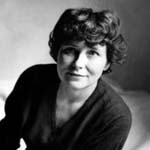In Memoriam: Doris Lessing
 This article was first published in theboar student publication, where you can read the full article online.
This article was first published in theboar student publication, where you can read the full article online.
A look back at the life of Doris Lessing, the Nobel Prize winning novelist and Warwick Honorary Graduate who has died at the age of 94 in November 2013 after writing on a variety of controversial subjects from feminism to social injustice.
The literary world is in mourning upon hearing the news that Lessing, one of the major figures in modern writing, has died peacefully at her London home.
She wrote extensively, producing more than 50 novels but also constructing plays, poems and short stories. With her career spanning the latter half of the twentieth century she used her works to shed light on its many absurdities.
Described as generous and open-minded, Lessing had a rich life, claiming at various stages to be a communist, socialist, feminist, atheist and finally a Sufi. She was fiercely dedicated to each of these beliefs and whilst she followed them she wrote heartfelt novels based on her experiences of them.
It is argued that even if she had written nothing else, The Golden Notebook (1962) would have secured her a place in the literary hall of fame. Perhaps her most controversial work, it was a piece about “new women” which stretched the boundaries of realist fiction. Through the character of writer, Anna Wulf, Lessing was able to comment on the form of the conventional novel. By dividing the narrative between four notebooks, she mirrored her own portrayal of breakdown and mental disintegration. What she didn’t realise is that the novel was also considered to be a call for women’s liberation but she never intended it to be a feminist piece.
As well as being a remarkable novelist, Lessing was talented at short-story writing, some of her most skilled material being The Habit of Loving (1957) and To Room Nineteen (1978) both offering tantalizing glimpses into the hearts and lives of different people.
In 2007 she returned to her north London home to find crowds of reporters outside her door, where she discovered that at 88 she had just become the oldest author and 11th woman to win the Nobel Prize in literature. For more on her reaction please read The Guardian article.
Doris Lessing had a wonderfully rich life and her versatility as a novelist meant many are left mourning her passing. Her readers were fiercely loyal, tested at times by her eccentricity and perversity and by her eagerness to try different styles, sometimes ones that did not suit her. Despite setbacks she remained to be someone wrote passionately and truthfully, basing many of her ideas on her experiences or her beliefs. To this end she kept her readers encapsulated down to the very last word.
